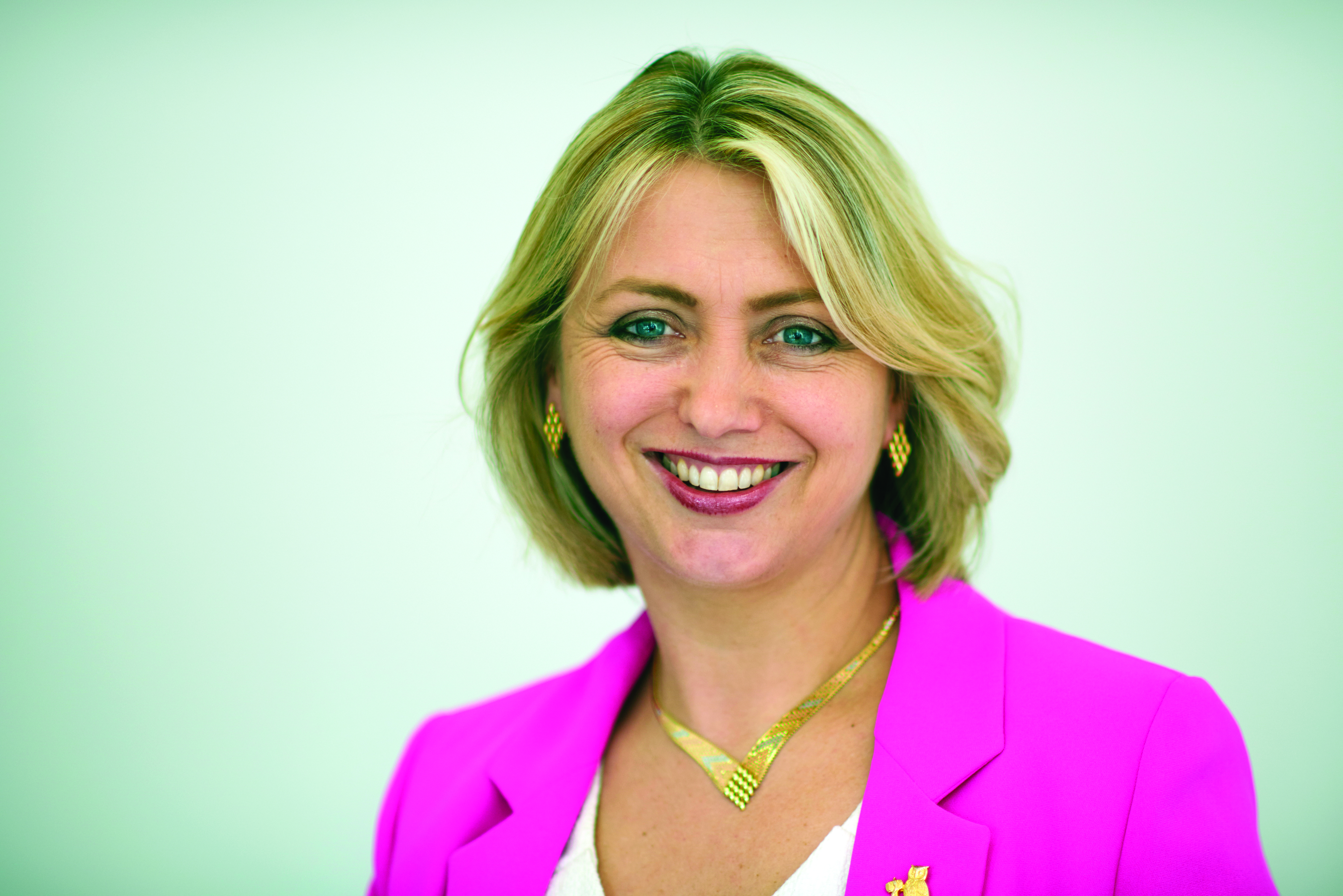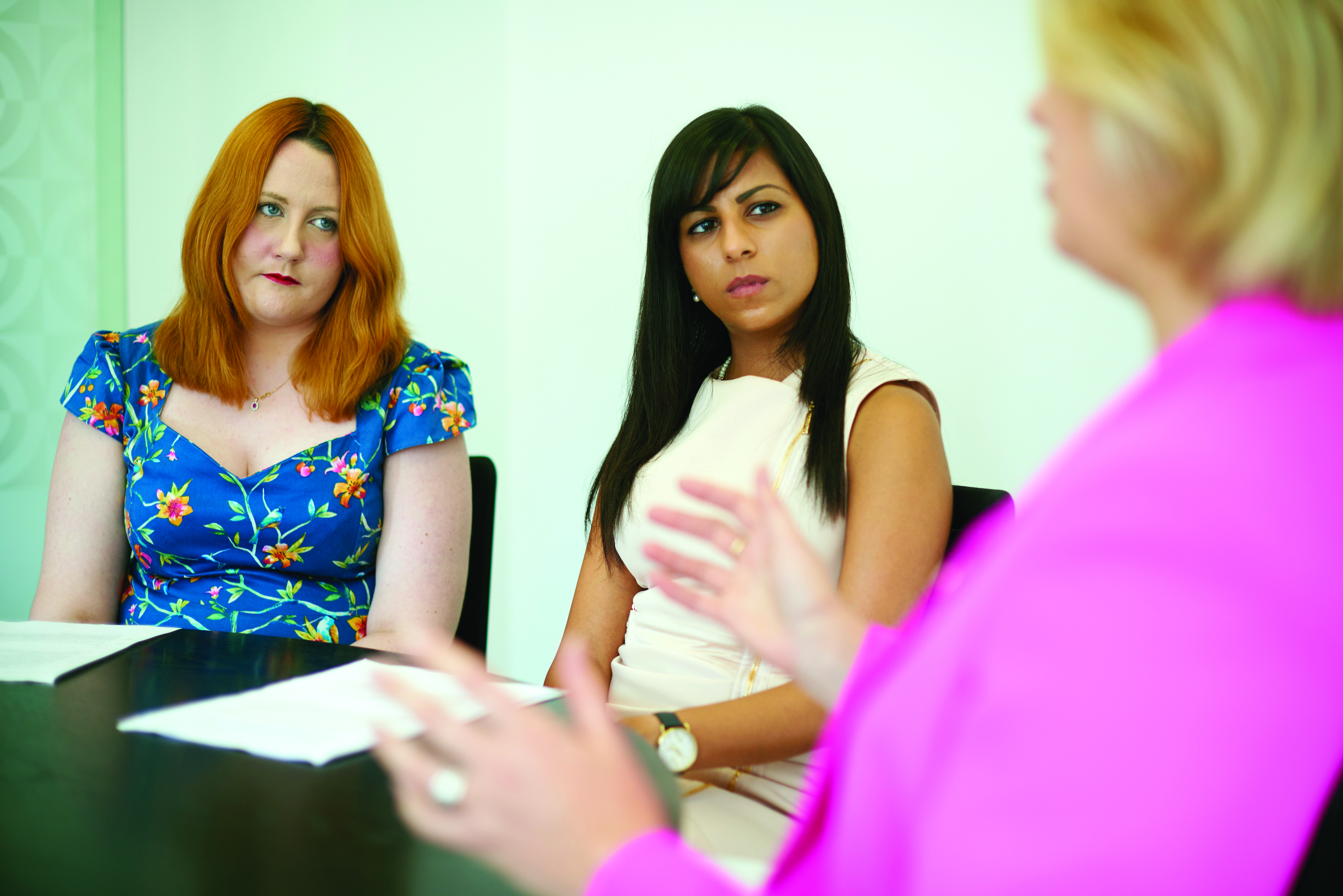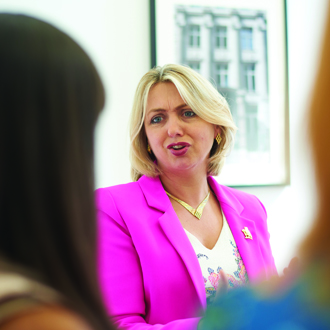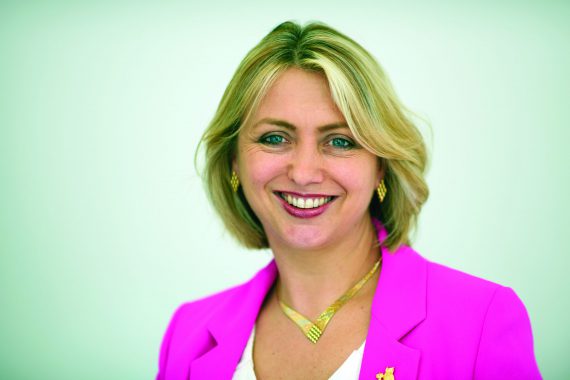
Dr Helen Stokes-Lampard – 3×2 – online
Dr Nishma Manek: There’s a lot of negativity around at the moment. That can feel quite hard for us and trainees often question whether they’ve entered the right profession. What would you say to them?
Professor Helen Stokes-Lampard: The negativity is probably the worst I’ve ever know and that’s tragic because it’s putting people off doing what, to my mind, is the greatest job in the world. Being a GP on a good day, in a surgery that’s properly resourced and properly staffed is fantastic; that richness of the relationship with patients, what you can do for people and to be part of the community is so amazing. That’s why I do it, and that’s why most of us do it.
The negativity is a consequence of a whole decade of under-investment and under-resource and so it’s understandable. But it’s not helpful. What I try and say to my colleagues is of course we all need a safe space to vent when you’re feeling negative and feeling down but talk to a senior colleague or get some external help. Don’t vent at a trainee. When you’re having a good day share that with a trainee, be inspiring for the future because we know the pendulum will swing back again.
NM: I couldn’t agree with you more. So when we think about our future as GPs how do you think that’s going to be different to how it’s been for you as a GP? It feels like we’re in a real state of change at the moment and I’m not sure what that’s going to look like for us.
We are in a state of change, that’s right, but general practice has always been changing. Looking back at the past, there’s always been a crisis in general practice, there’s always been GPs frightened about the future. But patients’ need for a trusted health care professional is constant.
I think what will be different is the way that we work. We’ll be working in larger and larger groups. When I started as a GP trainee the average size of a practice was 6,000 patients. Now it’s about 10,000 patients but I know of some amazing practices that have got 150,000 patients in them, but there are still those 1,000-2,000 patient practices as well.
There will be partnerships but that will be one of a range of ways of delivering care. The partnership model is a very powerful way of delivering care but it’s not the only way and that’s something that’s changing all the time. Some parts of the country have lost the partnership model completely. In others, it is fantastic and probably the only way of delivering care. That will change.
We’ve already seen a large proportion of the workforce choosing to be salaried but there is a swing back with younger GPs wanting to be partners again. That’s great to see.

Dr Helen Stokes-Lampard – 3×2 – online
Dr Heather Ryan (left) Dr Nishma Manek (centre)
Heather Ryan: You told the House of Lords that you consider that the partnership led model of general practice was not like to be fit for the long term future. The College clarified your views, saying you supported partnership and you thought that the independent contractor model should be nurtured and maintained. So why should we nurture and maintain something that you don’t think is fit for the long term future?
I was being asked about a much bigger issue and my actual sentence was along the lines of ‘I love the partnership model but the current model is not fit for purpose in its current context because newer doctors are not choosing to be partners, we can’t fill the vacancies’.
The partnership model need to flex. We need to fix issues like premises challenges and last partners standing issues and then suddenly partnership becomes far more attractive. There is also opportunities in working at scale: I’ve seen one model with clinical partners, managing partners, researching and teaching partners. Those kind of things need to be looked at.
However, I do believe the partnership model in terms of GP ownership and management is incredibly powerful. It’s a driver for change because GPs are fundamentally creative and when you run a business you can run it at a pace that you want to. If I go into the surgery and say ‘these blinds are scruffy I want new blinds’, we’ll put new blinds in. In a hospital, if you want new blinds it’s probably got to go through four committees and a procurement process.
However, we’ve got to be realistic that we can’t stick just to the old ways of doing things.
HR: Last April, when the GP Forward View was published College hailed it as perhaps the most significant piece of news for our profession since 1960s. What are your feelings about the Forward View now, and in retrospect would you have responded to it initially different?
Firstly, I wasn’t chair of the College when we responded. However, I agreed that the GP Forward View announcement was the most significant announcement for general practice since the 1960s, because actually a promise of £2.4bn a year from 2020 onwards is massive; a promise that at least 10.5% of NHS resource will go into general practice, bearing in mind last year it was only 8.3% of NHS resource, that’s massive; and 5,000 more GPs, 5,000 more other allied health care professionals, that’s massive.
Those are significant and I wouldn’t roll back from that. Quite different from a promise, however, is delivery on a promise. I was appointed to hold people to account and to ensure that promises are delivered on, to at least be watching and pointing out when things are, or are not being delivered on. The first thing I asked Council for when I was elected was their permission to conduct the interim review.
Out of the 12 clear deliverables that we could identify for that first year, we rated three red, three green and six amber. That’s really not great.
HR: The College have been calling for quite a long time for training to be extended to four years. Does that mean that actually the current three year training pathway isn’t fit for purpose?
GP trainees are telling us many of them don’t feel ready to commit to a career in general practice following their training because it hasn’t been enough for them. They’ve loved the clinical stuff, they’ve ticked the box, they’ve jumped the hurdles. They are safe, but they’re not robust or resilient enough. They haven’t got the experiences they need to take flight, to soar. They feel they’re still learning a lot for a while to come.
In 2008, the Tooke report suggested GP training needed to be extended significantly. The College undertook a big campaign to extend training by 2012. I was there in the office when Clare Gerada danced around the office because all four nations of the UK had agreed that GP training needed to be extended to four years. We thought it was sorted.

helen stokes lampard 330×330
What happened was a review called the Shape of Training, which was to look at the whole of medical post-graduate training and that put this into the long grass. It got delayed, and then at the end of last year we heard that ‘actually, sorry you can’t have four year training, you can have three years plus fellowships after training’. We’ve got those already in many places and we know it’s not enough because, once you’re in the workplace, priorities change and service commitments comes in.
Council has not yet decided whether it’s pushing for four years or longer – but it is going to push for at least four years. That will include at least two years based in general practice. For those who are able to go through the same pace and go through their exams in the timescale we hold them to, great. We want people to get the hurdles out the way, prove their clinical competence, get their MRCGP, so that fourth year is a time to be enriching your experience to fly, to do leadership training, to learn more about mental health, to being much more understanding of commissioning or practice models, of leadership, of partnership working.
NM: Do you think our training prepares us well enough for partnership though because it doesn’t feel like that to me?
It’s interesting because people have said they haven’t been told about partnership models, practice accounts or stuff like that. I remember very clearly having sessions with my trainer talking about the difference between salaried, being a partner, the implications for your pension. I sat there towards the end of my training with the practice accounts and he went through it and explained to me how a practice business runs.
I’m sad when I hear that’s not happening and partly it’s not happening because the programme is crammed full – it’s relentless, the amount of stuff you’ve got to do. The e-portfolio didn’t exist back in my day. It is different and we are cramming so much in. Something has to fall off. I’m saddened with this – it means people don’t feel ready for it because they don’t know enough about it.
NM: You’re almost up to your one year anniversary of being chair and it’s been a real whirlwind. You’ve had to be chair at a difficult time politically, financially, professionally. What’s been the hardest thing, what have you enjoyed the most and how’s the last year been for you?
The best bit is the people I get to meet. The GPs, the trainees, the medical students, the college staff who are almost universally amazing and wonderful people doing their best to do an amazing and wonderful job.
I’ve been reflecting on the good bits and the bad bits and I reckon it’s about an 80/20 split of being an amazing job and being a really, really grim job. The difficult stuff is the personal insults, or personal slights of things which are not personal at all, whenever I’m reflecting a college view or I’m trying to reflect a member’s view. Developing that thick enough skin to deal with real nastiness and personal vitriol.
One really powerful strategy that I picked up is the dealing with trolling and dealing with nastiness on social media and so I just don’t engage. If you’re anonymous you won’t get a reply from me on social media. If you’re a professional who has something to say, I care. I may not agree, I’d respect, I reserve the right to have a professional disagreement but I care if you’re prepared to own your comments. That’s been helpful and that’s particularly powerful with online forums you get all sorts of nonsense. Dr Anonymous thinks you’re stupid – well Dr Anonymous you don’t exist in my world.
Also, everything I do or say is a tight rope because I’m trying to represent 52,000 GPs and they’ve got 52,001 views. But also I have to have conversations with senior politicians. If I want to get in the door of Number 10, if I want to be sitting down and having a meaningful conversation with the health secretary and if I want to be having a meaningful conversations with the devolved nations leaders I have to be respected by them, and I have to respectful of where they’re at.
That doesn’t mean colluding with them. That doesn’t mean pandering to them. That doesn’t mean throwing fresh paint around when somebody big and important is coming to the College. It does mean being respectful and being professional and distilling what I hear from members which is sometimes very angry and embittered and turning it into a professional message.
Now as GPs we do that all the time; we transform information into something people can understand and so that’s what, that’s what I spend a lot of my time doing here but I am conscious it’s like walking a tight rope in high heels.
Pulse October survey
Take our July 2025 survey to potentially win £1.000 worth of tokens














